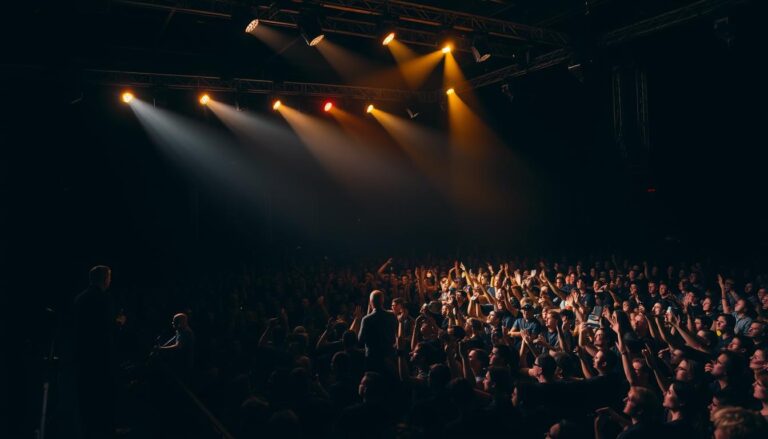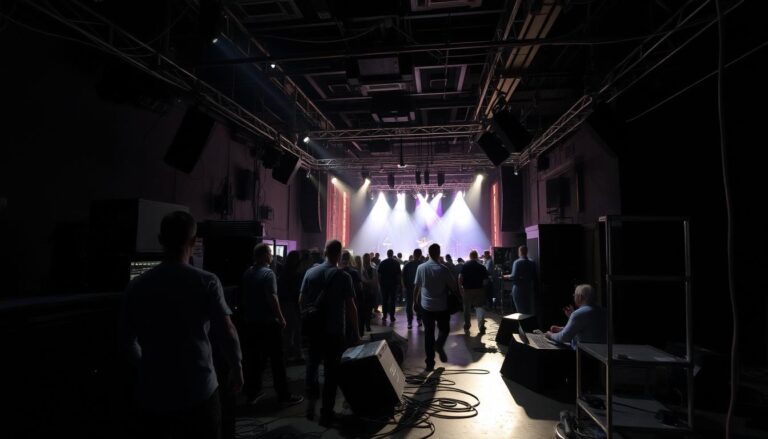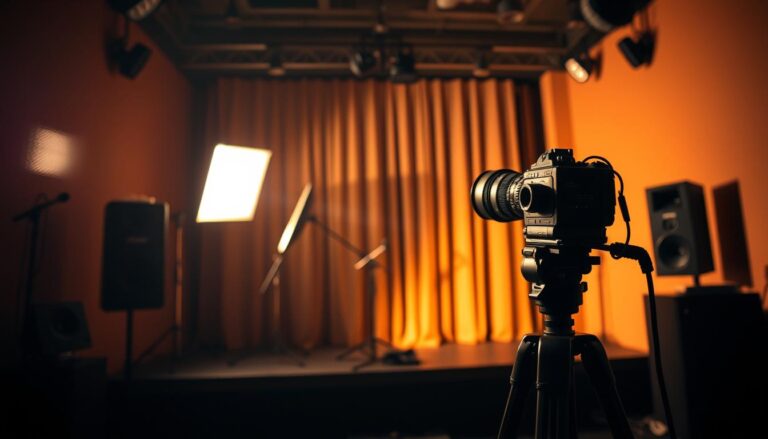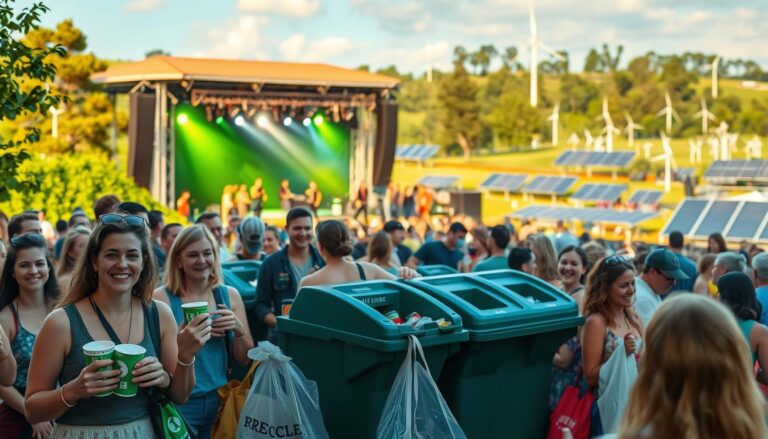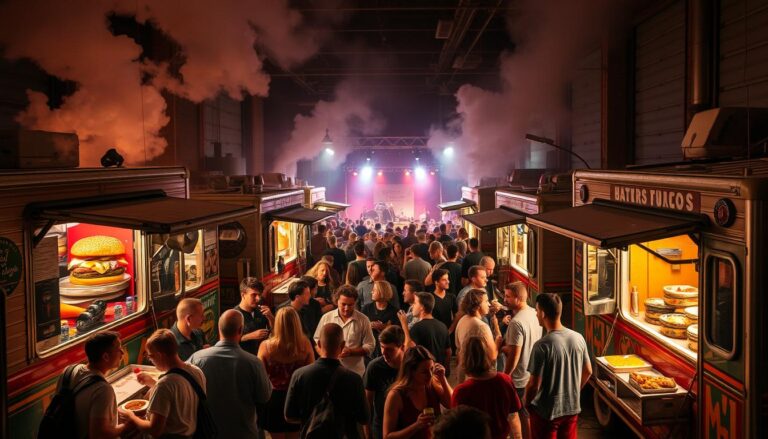Selecting the right venue is a crucial aspect of a band’s tour planning process. The decision involves considering various factors that can impact the success of a performance.
The venue selection process is not just about picking a location; it’s about creating an experience for the audience. Tour planning insights suggest that bands look for venues that align with their image and audience expectations.
Understanding the intricacies of venue selection can provide valuable insights into the music industry. By examining the key factors that influence a band’s decision, we can gain a deeper understanding of what makes a successful tour.
Key Takeaways
- Venue selection is a critical aspect of tour planning.
- Bands consider various factors when choosing a venue.
- The right venue can enhance the overall audience experience.
- Tour planning insights are essential for successful performances.
- A well-chosen venue aligns with the band’s image and audience expectations.
The Strategic Importance of Venue Selection
The venue selection process is a vital component of a band’s overall touring strategy. It involves careful consideration of various factors that can significantly impact the success of a tour.
Impact on Band Image and Branding
The choice of venue can significantly influence a band’s image and branding. For instance, performing at iconic or prestigious venues can enhance a band’s reputation and credibility. According to industry professionals, aligning venue choices with the band’s brand identity is crucial for maintaining a consistent image. Venues that resonate with a band’s genre or style can reinforce their brand, making their performances more authentic and appealing to their target audience.
How Venue Choice Affects Audience Experience
The venue choice directly affects the audience’s experience, with factors such as venue size, acoustics, and ambiance playing a significant role. A well-chosen venue can create an immersive experience, enhancing the overall enjoyment of the performance. For example, intimate settings can foster a closer connection between the band and the audience, while larger venues can provide an energetic and lively atmosphere. Ultimately, the right venue can elevate the performance, making it a memorable experience for attendees.
By understanding the strategic importance of venue selection, bands can make informed decisions that align with their tour planning insights and enhance their overall performance.
Understanding the Australian Music Scene
The Australian music scene is a vibrant tapestry of diverse regional flavors and iconic venues. This diversity is a key factor in the country’s thriving music industry, offering a wide range of opportunities for both local and touring artists.
Regional Differences Across Australian Cities
Australia’s major cities each have their unique music scene characteristics. For instance, Sydney’s live music venues are often associated with the iconic Enmore Theatre and the Sydney Opera House, while Melbourne is known for its cultural diversity and live music venues like the Forum Melbourne. Brisbane and Perth also have their distinct music cultures, with venues such as the Brisbane Riverstage and Perth Arena hosting top acts.
Iconic Australian Venues and Their Appeal
Australia is home to numerous iconic venues that attract artists and audiences alike. The Sydney Opera House is renowned for its stunning architecture and exceptional acoustics, making it a coveted performance space. Other notable venues include the Melbourne Recital Centre, known for its intimate setting, and the Red Hill Auditorium in Perth, which offers breathtaking views of the city.
Seasonal Considerations for Australian Tours
When planning a tour in Australia, it’s crucial to consider the seasonal variations across different regions. The summer months (December to February) are peak festival season, with events like Splendour in the Grass and Groovin the Moo drawing large crowds. Conversely, the winter months (June to August) are ideal for touring in the southern states, where the weather is cooler and more conducive to travel.
| City | Iconic Venue | Preferred Season for Touring |
|---|---|---|
| Sydney | Sydney Opera House | Autumn or Spring |
| Melbourne | Forum Melbourne | Winter |
| Brisbane | Brisbane Riverstage | Spring |
“The Australian music scene is incredibly diverse, with each city offering its unique flavor and venues that cater to a wide range of musical tastes.”
Understanding these regional differences, iconic venues, and seasonal considerations is essential for bands and promoters looking to navigate the Australian music scene successfully.
Market Research and Audience Demographics
Knowing your audience’s location and preferences is key to making informed decisions about venue selection. Effective market research helps you understand where your fans are concentrated and what kind of venues they prefer.
Identifying Your Fan Base Location
To identify your fan base location, you can analyze data from ticket sales, social media engagement, and fan feedback. Tools like Google Analytics and social media insights can provide valuable information about your audience’s geographical distribution.
Matching Venues to Your Target Audience
Once you have identified your fan base location, the next step is to match venues to your target audience. Consider factors such as venue capacity, location, and the type of events they typically host. For instance, if your band is popular among younger audiences, you might prefer venues that are known for hosting similar acts.
Using Social Media Analytics for Location Planning
Social media analytics can be a powerful tool for location planning. By analyzing engagement metrics and fan interactions on platforms like Facebook, Instagram, and Twitter, you can gain insights into where your fans are located and tailor your tour schedule accordingly.
| Location | Preferred Venue Type | Fan Engagement |
|---|---|---|
| Sydney | Large Indoor Arenas | High |
| Melbourne | Live Music Clubs | Medium |
| Brisbane | Outdoor Amphitheaters | High |
By leveraging market research and understanding audience demographics, you can make informed decisions about venue selection, ultimately enhancing the success of your tour.
Financial Considerations in Venue Selection
Selecting the right venue involves a complex interplay of factors, with financial considerations being paramount. The cost of hiring a venue, potential revenue streams, and available grants all play a crucial role in determining the viability of a tour.
Venue Hire Costs and Payment Structures
Venue hire costs can vary significantly depending on the location, size, and type of venue. It’s essential to understand the payment structures, including any deposits required, cancellation fees, and what’s included in the hire cost (e.g., equipment, staff). For instance, some venues may offer package deals that include technical support and staff, which can simplify the planning process.
Potential Revenue Calculations
Calculating potential revenue involves considering ticket sales, merchandise, and any potential sponsorship deals. Bands and their management teams must balance the need to fill a venue with the risk of losing money on a show. Using historical data and market research can help in making more accurate revenue projections.
Australian Grant Opportunities for Touring Artists
Australia offers various grant opportunities for touring artists, which can significantly offset the costs associated with venue hire and touring. Programs such as the Australia Council for the Arts grants can provide substantial support. It’s crucial for artists to research and apply for these grants well in advance to help fund their tours.

By carefully considering these financial aspects, touring artists can make informed decisions about venue selection, ultimately contributing to the success of their tour.
How Bands Choose Venues: The Decision-Making Process
Choosing the right venue is a pivotal decision for bands, reflecting a blend of artistic vision and practical considerations. The decision-making process involves various stakeholders, including booking agents, managers, and band members themselves.
The Role of Booking Agents and Managers
Booking agents and managers play a crucial role in the venue selection process. They bring their expertise and industry connections to the table, helping bands navigate the complex landscape of venue options. Booking agents are responsible for identifying potential venues, negotiating contracts, and ensuring that the chosen venue aligns with the band’s touring strategy.
Managers, on the other hand, oversee the broader aspects of the band’s career, including touring plans. They work closely with booking agents to ensure that venue choices support the band’s overall goals.
Band Member Input and Consensus Building
Band members themselves also have a significant say in the venue selection process. Their input is invaluable, as they have a deep understanding of their audience and the logistical requirements of their performances. Consensus building among band members is crucial to ensure that everyone is on board with the chosen venue.
This collaborative approach helps in making informed decisions that cater to the band’s collective vision and preferences.
Case Studies: How Australian Bands Make Their Choices
Australian bands offer insightful case studies on venue selection. For instance, bands like King Gizzard & the Lizard Wizard and Tame Impala have demonstrated a keen understanding of their audience and the Australian music scene. They carefully select venues that not only resonate with their fan base but also meet their artistic and logistical needs.
These case studies highlight the importance of a well-informed decision-making process in choosing venues that enhance the overall performance experience.
Technical Requirements and Stage Considerations
The technical aspects of a venue can make or break a band’s decision to perform there. When evaluating potential venues, artists must consider several key technical factors that directly impact the quality of the performance.
Sound System Quality and Acoustics
A high-quality sound system is crucial for delivering a great performance. Venues with superior sound systems and favorable acoustics can significantly enhance the audience’s experience. When assessing a venue’s sound capabilities, consider factors such as the type of sound system used, the quality of the speakers, and the venue’s reverberation characteristics. State-of-the-art sound systems can provide clear and balanced audio, ensuring that the audience enjoys the performance.

Lighting and Visual Production Capabilities
Lighting and visual effects play a vital role in creating an engaging live performance. Modern venues often feature advanced lighting systems that can be tailored to the specific needs of the act. When evaluating a venue’s lighting capabilities, consider the availability of LED lighting, the flexibility of the lighting rig, and the presence of any visual production equipment such as video screens and projection systems.
Backstage Facilities and Amenities
While the stage and sound system are critical for the performance itself, the backstage facilities can significantly impact the comfort and well-being of the performers. Amenities such as comfortable dressing rooms, catering services, and adequate rest areas can make a big difference. Ensuring that these facilities meet the needs of the artists can contribute to a successful and stress-free performance.
By carefully evaluating these technical requirements and stage considerations, bands and venue managers can work together to create memorable and high-quality live performances.
Building Touring Routes and Scheduling
When planning a tour, one of the most critical aspects is building a logical and efficient touring route. This process involves several strategic considerations to ensure that the tour is both financially viable and logistically manageable.
Logical Geographic Progression for Australian Tours
A logical geographic progression is essential for minimizing travel costs and maximizing audience engagement. For Australian tours, this often means starting in major cities like Sydney or Melbourne and then moving to other significant urban centers. For instance, a band might tour from Sydney to Brisbane, then to the Gold Coast, before heading to Perth. This progression reduces backtracking and allows for a more streamlined tour schedule.
| City | State | Typical Venue Capacity |
|---|---|---|
| Sydney | NSW | 5,000 |
| Melbourne | VIC | 6,000 |
| Brisbane | QLD | 4,000 |
Timing Considerations Between Shows
Timing is crucial when scheduling tour dates. Bands need to balance the desire to perform in as many locations as possible with the need for adequate rest and travel time. Typically, a gap of 2-3 days between shows in different cities allows for sufficient travel and preparation time. However, this can vary depending on the band’s experience and the complexity of their stage setup.
Key Considerations: Travel time, rest days, and logistical challenges.
Coordinating with Festivals and Major Events
Coordinating tour schedules with festivals and major events can be highly beneficial. Festivals like Splendour in the Grass or Groovin the Moo attract large audiences and can be a highlight of a tour. By scheduling tour dates around these events, bands can capitalize on the existing audience and promotional machinery.
Effective touring route planning and scheduling require a combination of logistical planning, market awareness, and flexibility. By considering geographic progression, timing between shows, and coordination with major events, bands can create successful and memorable tours.
Relationship Building with Venue Owners
Building a strong rapport with venue owners is crucial for artists looking to secure better deals and preferred dates. This relationship can significantly impact the success of live performances, making it easier to negotiate terms that benefit both parties.
Negotiating Better Terms Through Relationships
Establishing a good relationship with venue owners can lead to more favorable terms for artists. This includes potential discounts on venue hire costs or additional services like marketing support. According to industry insights, artists who have a history of professionalism and reliability are more likely to secure these benefits. For more information on building these relationships, visit BMI’s guide on building relationships with.
Communication Strategies for Securing Preferred Dates
Effective communication is key to securing preferred dates. Artists should maintain open lines of communication with venue owners, clearly stating their needs and being flexible when possible. This collaborative approach helps in finding mutually beneficial solutions.
Creating Long-Term Venue Partnerships
Long-term partnerships between artists and venue owners can lead to consistent audiences and reduced logistical complexities. By investing in these relationships, both parties can enjoy a more stable and predictable touring schedule. This stability can also open up opportunities for future collaborations and growth.
Conclusion: Creating Memorable Performances Through Smart Venue Selection
Choosing the right venue is a crucial aspect of creating memorable performances. As discussed, factors such as strategic importance, market research, financial considerations, technical requirements, and relationship building all play a significant role in how bands choose venues.
By understanding the Australian music scene, identifying target audience demographics, and considering financial and technical requirements, bands can make informed decisions when selecting a venue. Building strong relationships with venue owners and managers can also lead to better terms and long-term partnerships.
Smart venue selection is essential for delivering high-quality performances that leave a lasting impression on audiences. By considering these key factors, bands can ensure that their shows are memorable and successful, ultimately contributing to their overall success in the music industry.
